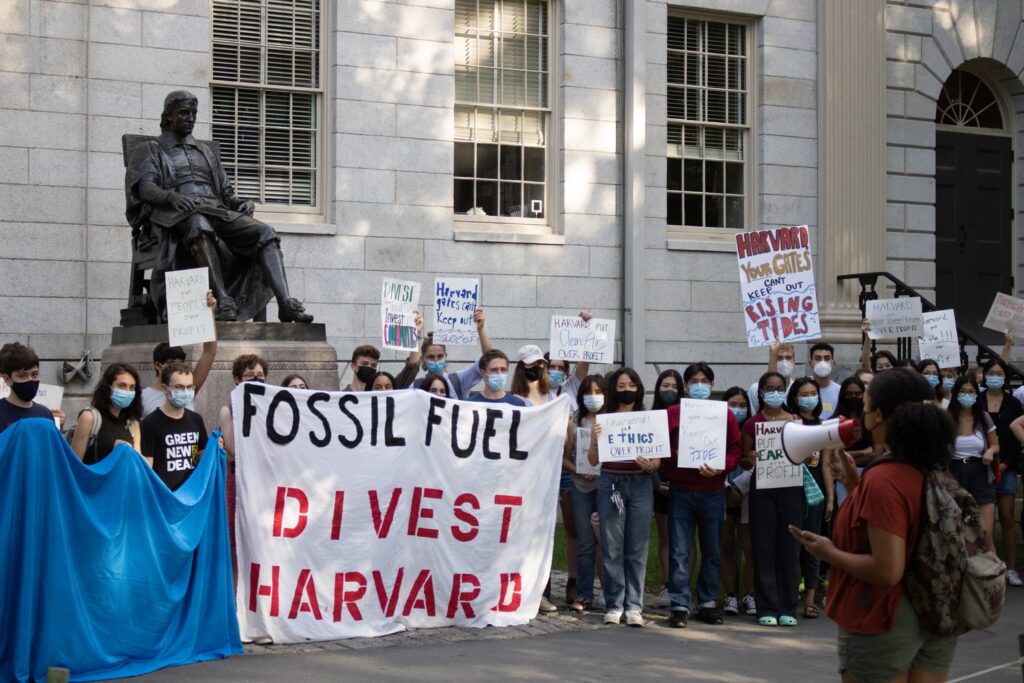
Divestment is the strategy of removing investments to influence a certain company, business, government, corporation, or any other entity to do something. Divestment “campaigns have been launched to end investment in countries, including South Africa during apartheid, Sudan, and Israel, and in industries, including tobacco and more recently, fossil fuels and private prisons.” The concept of divestment is the idea that “selling a stock is a public undertaking with the stated goal of influencing society” (Apfel, 2015).
From the perspective of divestment, our money matters. Where our money lies is what society has normalized and continued to support. Many people, especially students, who disagree with the current state of our societies chose to pursue “divestment because they believed it would ignite a debate and force” a “moral stand on the issue” (Apfel, 2015).

But does divestment work?
“One of the concerns about the fossil fuel divestment campaign was that it would similarly lack effect. There is no reason to believe a company knows, let alone changes any practices in response.” This has led to the idea of engagement, which is engaging with companies to steer them towards more ethical and sustainable practices. (Apfel, 2015).
If we look at divestment campaigns from the past we see that there are many different reasons for divestment and these lead to differing forms of success “In the case of South Africa, divestment was part of, and in support of, an extant political movement to end apartheid. When activists called for tobacco divestment, it was part of a major movement for reducing tobacco usage that was both political and social. In Sudan the campaign took place within the context of an ongoing sanctions regime by the US government” (Apfel, 2015).
Divestment in more political campaigns like South Africa and Sudan helped pressure governments to take moral stances against human rights violations while divestment against tobacco companies led to a reduced use of tobacco. But in all of these scenarios, divestment was not the sole reason for success but rather “divestment is more successful in support of a broader movement than on its own” which includes organizing, policy changes, changing public perception, and other forms of activism. (Apfel 2015). This especially rings true when divestment campaigns target larger corporations because other people might still invest and companies are not necessarily forced to change anything. (Apfel, 2015).
Even though divestment has challenges in being successful, “there are many opportunities for people of all kinds to engage with the institutions with which they already have a connection” and “demanding divestment is also compelling because it puts the reputations of highly respected institutions at stake.” (Apfel, 2015).
While looking at the advantages and disadvantages of divestment, and the effectiveness it poses in social change, there are many factors, but one common truth rings through the whole discussion. Change has been needed in the past and change will continue to be needed. This change comes from mass movements of people coming together and committing to activist tactics that they identify with whether that be divestment, policy changes, social perception, personal choices, or anything else. People live in different circumstances and being able to understand what our place in society is helps us focus on changing our communities. People may focus on different tactics or put different amounts of work into a movement, but as long as the movement is united and the people are committed, there is the possibility for change.
In the context of personal finance and well-being, individuals divesting from companies through tactics like boycotting and selling stocks may not be the most effective, but can design help build a system where the movement for change is accessible and easy to engage in?
References:
Apfel, D.C. (2015). Exploring Divestment as a Strategy for Change: An Evaluation of the History, Success, and Challenges of Fossil Fuel Divestment. Social Research: An International Quarterly, 82(4), 913-937. http://www.jstor.org/stable/44282147



